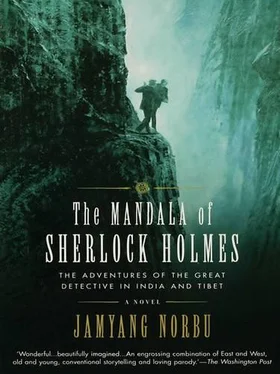I am not fully cognisant of how it all came about, but very unfortunately Mr Kipling managed to acquire details of the affair concerning The Pedigree of the White Stallion,' [1] which he coolly published in the Sunday edition of the Pioneer, 15th June 1891, entitled, 'The Great Game: The Lion's Reply to the Bear's Intrigues.' Essentially it concerned five confederated kings on the North-West frontier of India (who had no business to confederate) commencing earnest but secret negotiations with a firm of gun-makers in Belgium, a Hindu banker in Peshawar, an important semi-independent Mohammedan ruler to the south, and – the greatest cheek of all – a Northern power whose interest could, in no way, be said to coincide with that of the Empire's.
The Department had not been wholly unexpectant of such a development, and I had been assigned north for more than a year to keep a sharp eye on the doings of our five rajah sahibs. It is not necessary for me to elucidate the modus operandi of the following; suffice it to say that by establishing amicable relations with an underpaid secretary and transferring a large amount of rupees, I managed to arrange the betrayal of some vital mursala, 'King's letters,' or state correspondence which let all the cats out of the bag, so to speak. I had forwarded the revelations via E.23, C.25, and eventually K.21 to Colonel Creighton, the head of our Department.
The government acted with unusual promptitude and despatch. An army of eight thousand men besides guns were sent nprth, and it fell upon the five kings ere they were ready. But the war was not pushed. The croops were recalled because the government believed the five kings were cowed; and it is not cheap to feed men on the high passes. It was not the best of solutions; in fact, I thought it the most reprehensible laxity on the part of the government to allow the five kings – who were as treacherous as scorpion-suckled cobras – to even live. But officially I am debarred from criticising any action of my superiors, and I am only stating this unofficially merely to elucidate the political situation.
When that issue of the Pioneer came out with Mr Kipling's indiscreet (to say the least) story, it caused a tremendous hullabaloo in the Department. The Colonel Sahib realised that the inspiration for Mr Kipling's tale had come from within, ab intra, so to speak, and was beside himself with rage at this most base act of treason. Normally an unemotional and reserved man, he stormed through the corridor of the departmental bungalow at Umballa with the 'righteous fury of a Juvenal.' Grim interviews were conducted in his office with all and sundry connected to the case, even I having to spend an uncomfortable hour under the Colonel's piercing eyes. Of course, I managed to acquit myself well enough, though to be scrupulously correct I must admit to shedding a little perspiration before the interview was finally terminated, sine die, and I was allowed to leave the room.
The resultant conclusion of the investigation revealed a less critical flaw in the integrity of our Department than we had initially feared. Two babus from the archives were sacked, posthaste, and a young English captain with literary ambitions (he had contributed poetry, among other things, to the Pioneer) was transferred to an army transport division in Mewar, to breed camels and bullocks for the rest of his career. Mr Kipling was informed, through the editor of the Pioneer, that his conduct in this affair had not been entirely gentlemanly, but that the government would take no action if Mr Kipling would refrain from the furtherance of his journalistic career in India, and return home to England – which he did.
To our relief all of us fieldmen were cleared, though C.25 felt that his izzat had been impugned by the Colonel's suspicions. But a Pathan is always touchy about matters of honour and horseflesh.
Then one day, the thin black body of E.23 was found in a dark gully behind the gilt umbrellas of the Chatter Munzil in Lucknow. A dozen knife wounds, besides other fearful mutilations, had precipitated the untimely demise of the poor chap.
I am a good enough Herbert Spencerian, [2] I trust, to meet a little thing like death, which is all in my fate, you know. But the long arms of the fivekings beyond the passes, and also the nabob of that certain Mohammedan principality to the south, beyond the Queen's laws, (who had all been embarrassingly compromised in the aforementioned affair of 'The Pedigree of the White Stallion') did not only stop at death. Barbaric tortures, painful even to contemplate, generally preceded the vile act of murder.
Propelled by such uncomfortable ruminations, I hastened to petition the Colonel to grant indefinite leave, on full pay, to those of us who had been compromised by Mr Kipling's indiscretions, so that we could become fully incognito till matters had quietened down somewhat. The Colonel agreed to my proposal except on one point where he made a frugal amendment. Accordingly, K.21 was sent with his Lama to retire temporarily to a monastery on the Thibetan frontier, and C.25 to Peshawar to be under the protection of his blood-kin. And I, on halfpay, departed jolly quick from my normal stamping grounds in the hills, to the great port city of Bombay, to bury myself inconspicuously in that teeming multitude of Gujuratis, Mahharatis, Sikhs, Bengalis, Goanese, British, Chinese, Jews, Persians, Armenians, Gulf Arabs and many others that composed the multifarious population of the 'Gateway of India'.
Yet, in spite of everything, I must be grateful to Mr Kipling; for it was my secret exile to Bombay that direcdy resulted in my providential meeting with a certain English gendeman, in whose company I embarked on the greatest adventure of my life, resulting (due to the subsequent publication of select ethnological aspects of the journey) in the fulfilment of my life-long dream to become a Fellow of the Royal Society.
But, far more than this great honour, I shall always cherish the true friendship and affection bestowed upon me by this gentleman, a man whom I shall always regard as the best and wisest I have ever known. [3]
1 The Mysterious Norwegian
The post-monsoon sky over the Arabian sea is hazeless and clear blue as a piece of Persian turquoise. The air, washed by the recent rains, is so fresh and clear that astride Malabar Point at Bombay one fancies that one can make out the coast line of Arabia, and even faintly smell in the breeze some of those '… Sabean odours from the spicy shore of Araby the blest.' [4]
Of course it is all pure romantic fancy on my part; the whole bally thing is too far away to smell or see, but from my vantage point I managed to spot what I had come all this way to look for.
Through a scattering of dhows with their graceful lantine sails arching in the wind, the S.S. Kohinoor of the Peninsular and Oriental Steam Navigation Company cleaved the blue waters, the twin black funnels of the liner trailing a wispy ribbon of smoke. The ship was late, it should have arrived this morning. Through a pair of sub-efficient binoculars I had purchased at Bhindi Bazaar, I could just make out the name on the port bow. I quickly walked over the road to a waiting ticcaghari. Hauling myself up onto the seat, I signalled to the coachman to proceed.
'Chalo!'
'Where, Babuji?'
'The harbour, jaldi!'
He lashed the thin pony with a length of springy bamboo and the carriage trundled down Ridge Road. I popped a piece of betel-nut into my mouth and chewed it contemplatively while I once again reviewed my plan of action.
Four months had passed since I had arrived at Bombay. I had peacefidly passed the time making ethnological notes on the cult of the local goddess Mumba from whom the city had taken its name. But the Colonel must have felt that whatever potential dangers there had been had receded by now (and that I had received enough salubrious divertissement on departmental half-pay), for just a week ago our neighbourhood postman, a bony old Tamil from Tuticorin, delivered a taar (which is the native term for a telegram) to my temporary quarters behind the Zakariya mosque.
Читать дальше












